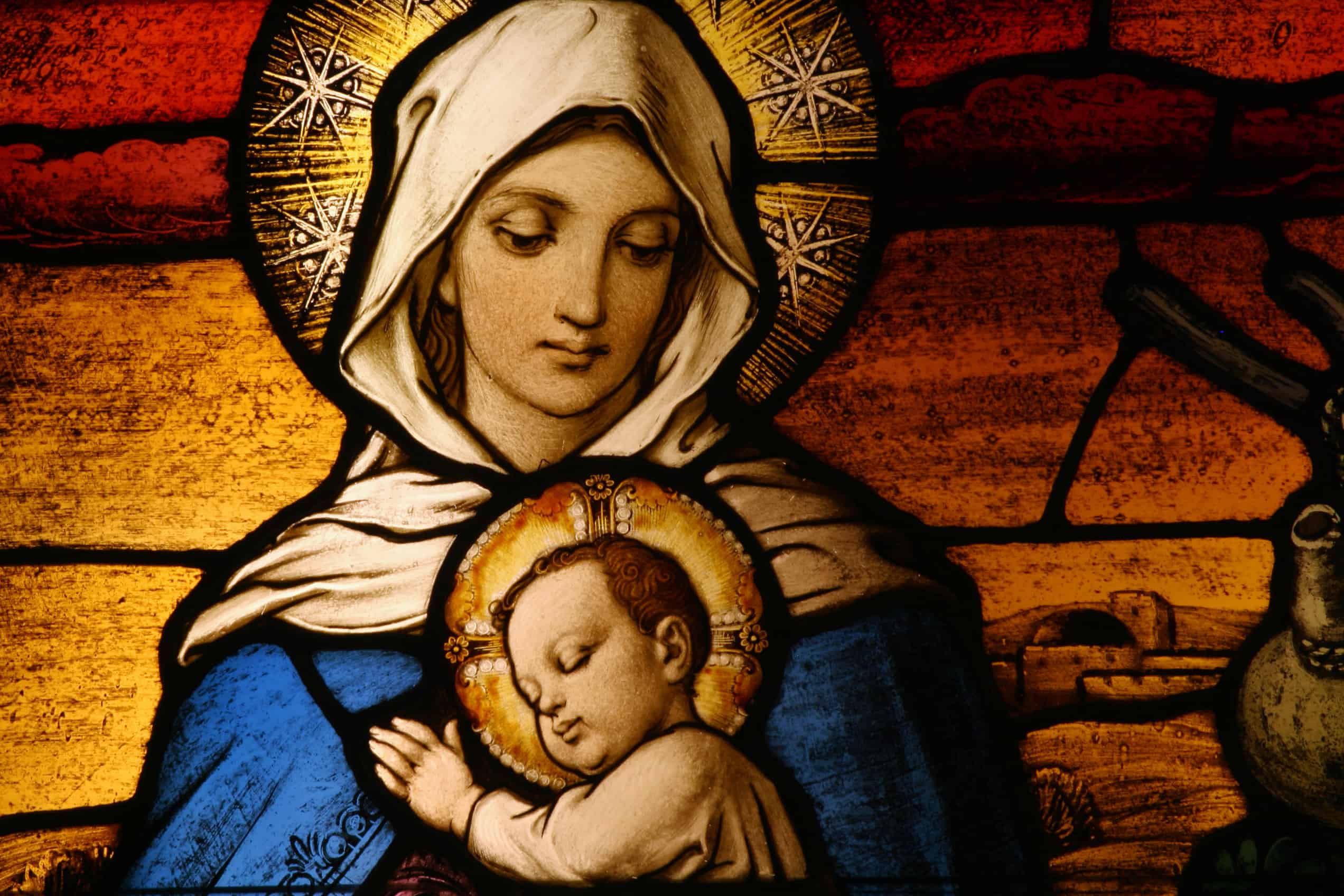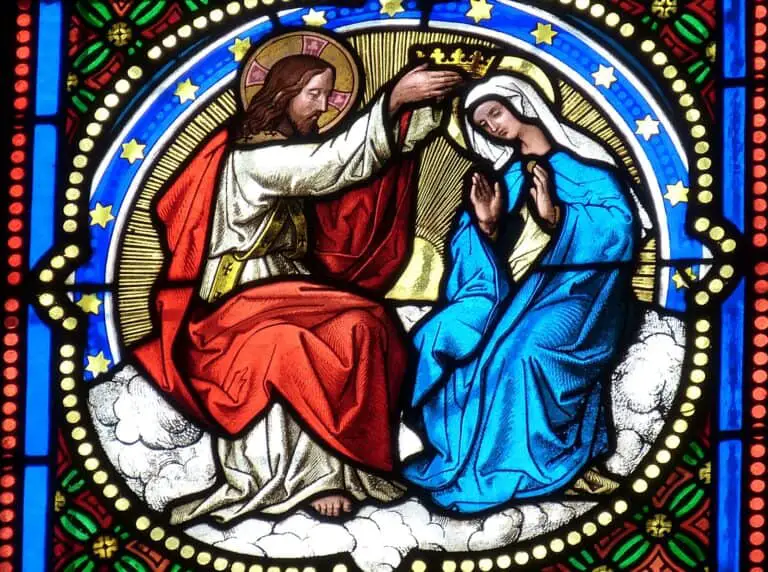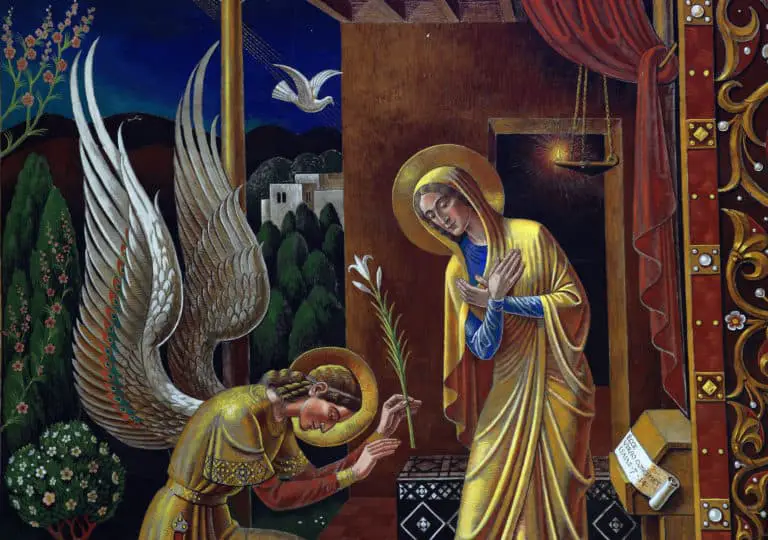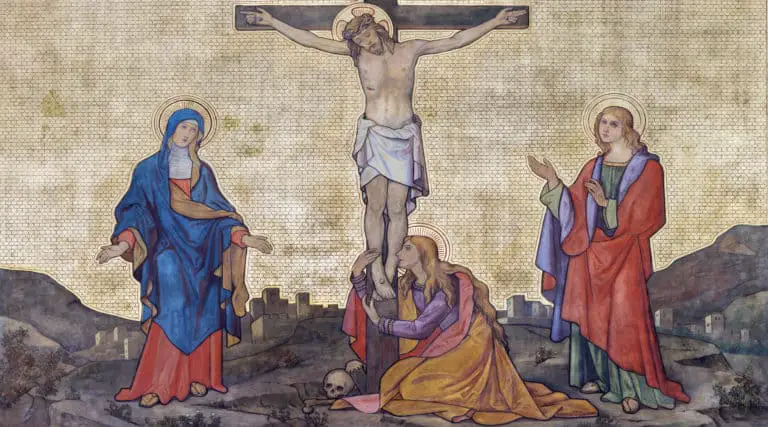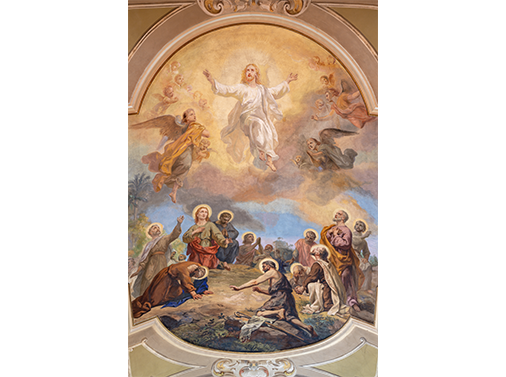What do Catholics believe about Mary, the Mother of Jesus?
Mary, the Mother of Jesus is given prominence in the Catholic Church not as a ‘goddess’ worthy of worship, but as a humble Servant of God, who through Her ‘fiat’ (her yes) to God is raised to the highest honour in Heaven after the Holy Trinity.
The Catholic Church, through four Marian Dogmas, teaches that – Mary is the Mother of God; She is, was and ever will be a Virgin (Perpetual Virginity); Mary was Immaculately Conceived; at the end of Her earthly life, Assumed body and soul into Heaven. These dogmas are revealed by scripture and taught through tradition. Mary is known by many titles including Mediatrix and Co-Redemptrix.
What does the Bible tell us about Mary?
An exchange in conversation between people provides a clue into the relationship, the persons and the overall qualities of each. There are several key passages in the Bible that provide an insight into who is Mary, Her role, qualities and overall relationship.
The very first time we meet Mary is in St Luke’s Gospel, it is Mary’s interaction with the Angel Gabriel. It is important to note that St John’s Gospels makes no mention of Mary’s name. Mary is mentioned as the ‘Women’ in two separate passages:
The first is at the Wedding at Cana (St John 2:1-11). “And Jesus saith to her: Woman, what is that to me and to thee? My hour is not yet come” (St John 2:4) and again at the Crucifix “When Jesus therefore had seen his mother and the disciple standing whom he loved, he saith to his mother: Woman, behold thy son. After that, he saith to the disciple: Behold thy mother. And from that hour, the disciple took her to his own” (St John 19:26-27).
Without the Synoptic Gospels of St Matthew, St Mark and St Luke, we would never have known the name of Mother of Jesus. In addition, apart from several mentions of Mary and Her acceptance and surrender to God’s Will and Her journey with Her Son Jesus, the last we see of Mary is at Pentecost, in the Upper Room (Acts 1:14). However many of the gaps are filled in through the Protoevangelium of St James, early Church writings and traditions and several approved private revelations – Venerable Mary of Agreda ‘The Mystical City of God’; and Venerable Anne Catherine Emmerich “The Life of the Blessed Virgin Mary”.
These are great reads and give some incredible insights. Personally I have read ‘The Mystical City of God’ and ‘The Life of the Blessed Virgin Mary.’ The Protoevangelium of St James should be read with care as there some inconsistencies with the other two volume sets.
What are the Twelve Understandings and Qualities about Mary?
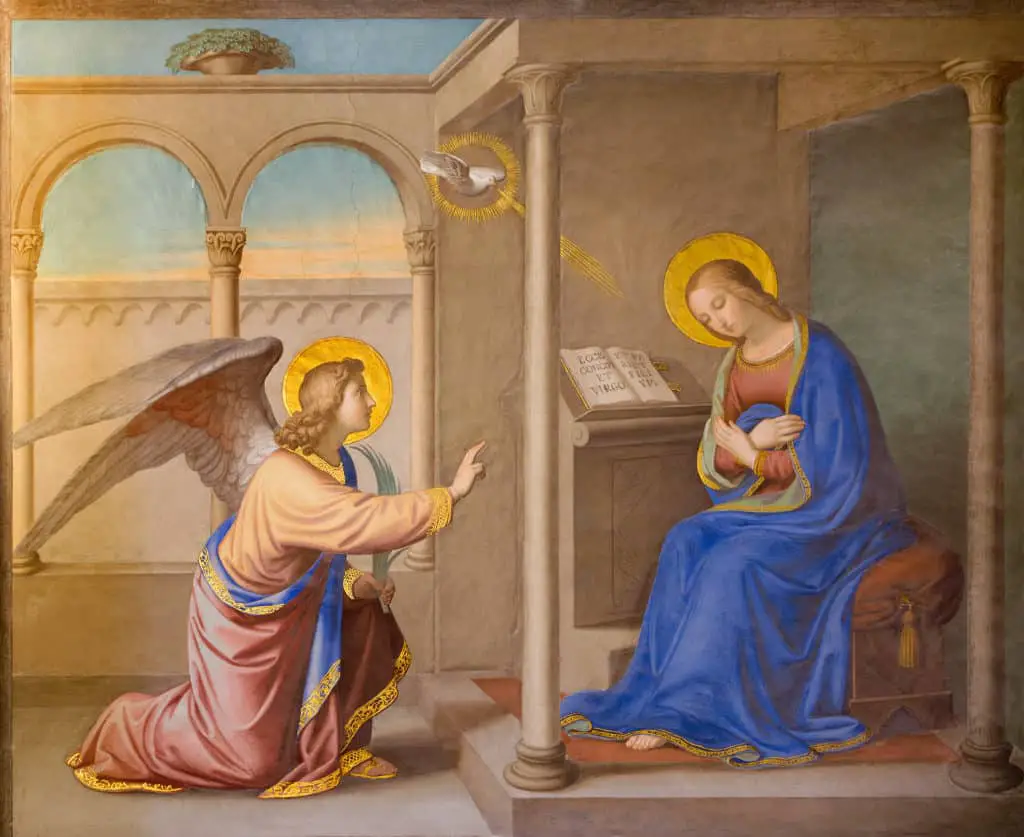
The greeting of the Angel Gabriel to Mary in St Luke’s Gospel gives the reader tremendous insight into understanding who is Mary and Her qualities.
Here is the quote in its entirety:
“In the sixth month the angel Gabriel was sent from God to a city of Galilee named Nazareth, to a virgin betrothed to a man whose name was Joseph, of the house of David; and the virgin’s name was Mary.
And he came to her and said,
“Hail, full of grace, the Lord is with you!”
But she was greatly troubled at the saying, and considered in her mind what sort of greeting this might be.
And the angel said to her:
“Do not be afraid, Mary, for you have found favor with God. And behold, you will conceive in your womb and bear a son and you shall call his name Jesus. He will be great, and will be called the Son of the Most High;
and the Lord God will give to him the throne of his father David,
and he will reign over the house of Jacob for ever;
and of his kingdom there will be no end.”
And Mary said to the angel,
“How can this be, since I have no husband?”
And the angel said to her,
“The Holy Spirit will come upon you,
and the power of the Most High will overshadow you;
therefore the child to be born will be called holy,
the Son of God.And behold, your kinswoman Elizabeth in her old age has also conceived a son; and this is the sixth month with her who was called barren. For with God nothing will be impossible.”
And Mary said,
“Behold, I am the handmaid of the Lord; let it be to me according to your word.”
And the angel departed from her. (St Luke 1: 26-38)
When we read this passage carefully we gain an insight into this interaction with the Angel, an understanding of Mary and Her qualities.
The following highlights these with the corresponding passage:
| Understanding Mary / Qualities of Mary | Scripture Reference |
| A Virgin and bethrothed to Joseph from the house of David | St Luke 1:27 |
| Nazareth a city in Galilee, Her name is Mary | St Luke 1:27 |
| Someone of Significance as she is Greeted with the word ‘Hail’ | St Luke 1:28 |
| Lord is with Her and favoured by God and trouble by the greeting | St Luke 1:28-29 |
| She will conceive the Son of the Most High (GOD) | St Luke 1:32 |
| Mary asks “How can this be since I do not know man” (Virgin)? | St Luke 1:34 |
| After listening to the explanation of the Angel, Mary surrenders to God’s will “Behold the handmaid of the Lord: Be it done unto me according to thy Word” | St Luke 1:38 |
| Humble | St Luke 1:46-48 |
| Vow of Virginity | St Luke 1:34 |
| Trust | St Luke 1:38 |
| Loyalty | St Luke 1:38 |
| Surrender to the Will of God – ‘Her Will is God’s Will’ | St Luke 1:38 |
Why Catholics revere Mary?
This passage from St Luke’s Gospel lays down the platform as to the role of Mary. Mary surrenders totally to the Will of God. In fact from the writings of Venerable Mary of Agreda in the ‘Mystical City of God’, Mary at the early age of three year was dedicated to the Temple by Her parents St Anne and St Joachim. Mary took the vow of Virginity from an early part of Her life.
Mary is revered by Catholics not as a ‘goddess’ but as the Mother of Jesus, who is the Son of the Most High (the Son of God). We cannot ignore this fact! It is both Scriptural and Traditional.
Since the Messenger of God (the Angel), Gabriel and God Himself, have given Mary such prominence in the Saviours coming, in Heaven and on Earth, then who are we to deny Her this rightful role?
One thing that God is not, God does not use people for purposes then lessens their importance. God exalts those who are humble and rewards those who do His will.
Did Mary do God’s will?
The short answer to this question, ‘Did Mary do God’s Will?’ is Yes, She certainly did and without hesitation. Whilst She did ask ‘How can this be since I do not know mas?’ In other words Mary was asking ‘I have taken the vow of Virginity and help me understand how this will take place?’
She was never questioning or challenging God. We do see a similar response from Zechariah who is informed that his wife, Elizabeth in her old age and barron will conceive a child. Zechariah in some way was mocking God and saying ‘come on my wife is old’. For this, Zechariah was struck mute and would regain his speech once his son was born and he wrote on a tablet that his name will be John.
Is Mary the Mother of God?
Mary was chosen as a vessel by God to bring forth the promised Messiah. She in Her understanding, knowledge and wisdom knew that the Messiah would be born from a Virgin but she did not know that God had chosen Her.
Therefore God (Jesus the second person of the Holy Trinity and from all eternity) chose and designed His own Mother. What would you think God would do with His own Mother who did everything He asked?
Mary is not some discard that God chooses to use. Doing God’s will, Mary is rewarded with the highest honour in Heaven. She is the ‘Woman’ foretold in Genesis 3:15 ‘I will put enmity between you (the serpent, Satan) and the Woman; between your offspring and Her offspring. She will crush your head and you will strike at Her heel’.
The next passage of Scripture tells us some more information about Mary, these come from the words of her kinswoman Elizabeth and found once again in St Luke’s Gospel:
“In those days Mary arose and went with haste into the hill country, to a city of Judah, and she entered the house of Zechari′ah and greeted Elizabeth. And when Elizabeth heard the greeting of Mary, the babe leaped in her womb; and Elizabeth was filled with the Holy Spirit and she exclaimed with a loud cry,
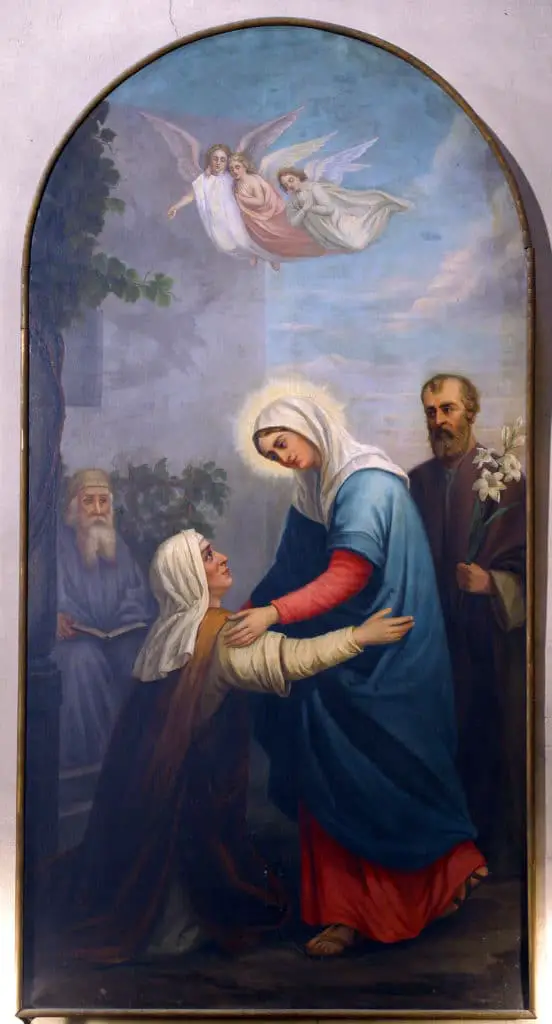
“Blessed are you among women, and blessed is the fruit of your womb! And why is this granted me, that the mother of my Lord should come to me?
For behold, when the voice of your greeting came to my ears, the babe in my womb leaped for joy.
And blessed is she who believed that there would be a fulfillment of what was spoken to her from the Lord.” (St Luke 1:39-45).
There is much Theology in the words of Elizabeth, ‘the Mother of my Lord’; ‘the babe in my womb leaped for joy’ and ‘blessed is she who believed that there would be fulfilment of what was spoken to her from the Lord’.
Very powerful indeed!
The word ‘Lord’ is in reference to ‘God, in Hebrew YHWH (YAWEH).
Elizabeth declares that Mary is the Mother of God. Elizabeth’s insight is Divinely inspired and for all generations to witness in Scripture and Tradition.
The babe in Mary’s womb is the saviour, the Lord, the Son of God, God made Man [incarnate].
What does that make Mary?
Mary therefore is the Mother of the Saviour, the Mother of God. Chosen by God.
This is a dogma of Faith inherent in the words of Elizabeth that the Catholic church teaches and developed in the Council of Ephesus (431AD) that Mary is the ‘Theotokos’ (Greek) the God bearer or the Mother of God!
Is the Hail Mary Biblical? Why do Catholics pray to Mary?
The Hail Mary or Ave Maria (Latin) or the Angelic Salutation is Biblical and its clear settings comes from the passages we have read above from St Luke’s Gospel.
Note that many versions of the Bible have watered down the words of the Angelic Salutation and for this I will reference from the Douay-Rheims which is a translation from the Latin Vulgate of St Jerome in the late 4th Century to early 5th Century.
Hail (Mary), full of grace, the Lord is with thee: blessed art thou among women (St Luke 1:28). 1:28).
Blessed art thou among women and blessed is the fruit of thy womb. (St Luke 1:42).
Holy Mary, Mother of God (St Luke 1:43).
Pray for us sinners, now and at the hour of our death (St James 5:16).
Truly a prayer reflecting on the Mother of Jesus, Mother of God and Our Mother.
Acknowledging the words of the Angel Gabriel and the words of Elizabeth.
Catholics therefore pray to Mary for assistance and not as a goddess. If we truly follow Jesus and acknowledge that Jesus who is God, created the Divine Law and the Fourth Commandment, ‘Honored His Mother and His Father (both the Heavenly Father and His Foster Father St Joseph)’, then we imitate Jesus Christ. For God willed it this way and inspired the Gospel writers to send a prayer to all generations the words of the Angel Gabriel and Elizabeth and through the consistent teaching of the Catholic Church through tradition.
St Thomas Aquinas gives three levels of worship and honour to God, Mary and the communion of Angels and Saints.
God, the Holy Trinity is worshipped at the highest level called Latria.
Mary is given honor called Hyper-dulia.
Angels and Saints called Dulia.
A Saint who is prominent is given held in high esteem is St Joseph which is a level above Dulia called Proto-dulia.
Therefore it is a mistake to state that Catholics worship Mary.
Mary’s beautiful prayer of praise to God.
Then comes the beautiful words of Mary, her words of praise and humility in the Magnificat:
“My soul magnifies the Lord,
and my spirit rejoices in God my Savior,
for he has regarded the low estate of his handmaiden.
For behold, henceforth all generations will call me blessed;
for he who is mighty has done great things for me,
and holy is his name.
And his mercy is on those who fear him
from generation to generation.
He has shown strength with his arm,
he has scattered the proud in the imagination of their hearts,
he has put down the mighty from their thrones,
and exalted those of low degree;
he has filled the hungry with good things,
and the rich he has sent empty away.
He has helped his servant Israel,
in remembrance of his mercy,
as he spoke to our fathers,
to Abraham and to his posterity for ever.” [St Luke 1: 46-55]
Note several points from this prayer of Mary we call the ‘Magnificat’.
The Mother of Jesus is not given the title as saint but Blessed as She Herself through Her humility foretold ‘All generations will call me blessed’.
Secondly, Mary has been saved as she exalted “my soul magnifies the Lord [state of sanctifying Grace, God is in her soul], and my spirit rejoices in God my saviour” [the Saviour hasn’t redeemed humanity so Mary references that she has been saved].
This is the second Marian Dogma which was declared by Blessed Pius IX in his document, “Ineffabilis Deus,” on December 8th, 1854:
Stating: “We define that the doctrine which declares that the most Blessed Virgin Mary, in the first instant of her conception, by a singular grace and privilege granted to her by Almighty God, through the merits of Christ Jesus, Saviour of mankind, was preserved from all stain of original sin, is a doctrine revealed by God and therefore must be held firmly and constantly by all faithful Christians.”
It is a long held belief that pre-dates any Protestant revolution (1517) that Mary is revered and honoured in the Catholic Church tradition and has its basis in the Bible. Both Scripture and Tradition are consistent and work in unisons to bring the deposit of faith. Therefore no mere mortal can take what God has established and dishonour His Mother, after all if your Know Mary you will Know Jesus, but no Mary there is no Jesus.
Give Mary a chance, you will not be disappointed. Mary is waiting to love you like Her son and daughter. Mother of God, intercede for us and pray for us.
